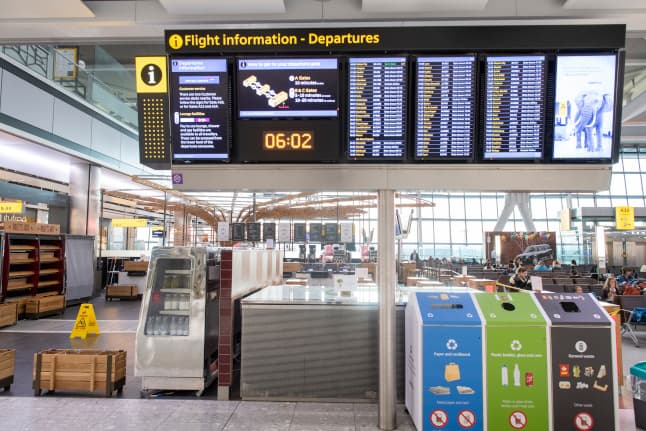Sweden to require UK travellers to show negative coronavirus test

Sweden will as of January 1st require non-Swedish nationals travelling from the UK to show a negative test result before they are allowed to enter the country.
People travelling from the UK will be required take a negative coronavirus test at the most 72 hours before arriving in Sweden. Swedish citizens can't be legally prevented from entering the country and will be exempt from this rule, said Home Affairs Minister Mikael Damberg as he announced the new requirement on Wednesday.
A blanket ban on flights from the UK to Sweden will expire on December 31st, but a separate entry ban on people travelling from the UK remains in place until, for now, January 21st. Swedish citizens, people who live and work in Sweden, and people travelling for urgent family reasons, are exempt from the entry ban. But the latter two groups will now have to show a negative coronavirus test before they are allowed to enter Sweden.
People who transport goods will not have to show a negative test result, so as not to hinder the transportation of essential goods such as medication or medical equipment.
Everyone travelling from the UK, regardless of nationality, is strongly urged to get tested for ongoing coronavirus infection as soon as possible after arriving in Sweden, and repeat the test on the fifth day after leaving the UK.
They are also urged to act as though they are infected with Covid-19 while waiting for their test and test results, which includes staying at home, avoiding close contact with others and maintaining good hygiene, and self-isolating for at least seven days after arriving in Sweden. This applies both to adults and children.
Here's a link to the Public Health Agency's guidelines for travellers from the UK once they've arrived in Sweden. These recommendations apply to everyone, regardless of whether or not they tested negative before arrival.
The decision to tighten travel restrictions against the UK earlier this month was taken due to the spread of a mutated form of coronavirus, which first appeared in London and Kent. It is reported to be more contagious than other strains, but based on what scientists know so far, does not appear to cause more serious illness.
Comments (5)
See Also
People travelling from the UK will be required take a negative coronavirus test at the most 72 hours before arriving in Sweden. Swedish citizens can't be legally prevented from entering the country and will be exempt from this rule, said Home Affairs Minister Mikael Damberg as he announced the new requirement on Wednesday.
A blanket ban on flights from the UK to Sweden will expire on December 31st, but a separate entry ban on people travelling from the UK remains in place until, for now, January 21st. Swedish citizens, people who live and work in Sweden, and people travelling for urgent family reasons, are exempt from the entry ban. But the latter two groups will now have to show a negative coronavirus test before they are allowed to enter Sweden.
People who transport goods will not have to show a negative test result, so as not to hinder the transportation of essential goods such as medication or medical equipment.
Everyone travelling from the UK, regardless of nationality, is strongly urged to get tested for ongoing coronavirus infection as soon as possible after arriving in Sweden, and repeat the test on the fifth day after leaving the UK.
They are also urged to act as though they are infected with Covid-19 while waiting for their test and test results, which includes staying at home, avoiding close contact with others and maintaining good hygiene, and self-isolating for at least seven days after arriving in Sweden. This applies both to adults and children.
Here's a link to the Public Health Agency's guidelines for travellers from the UK once they've arrived in Sweden. These recommendations apply to everyone, regardless of whether or not they tested negative before arrival.
The decision to tighten travel restrictions against the UK earlier this month was taken due to the spread of a mutated form of coronavirus, which first appeared in London and Kent. It is reported to be more contagious than other strains, but based on what scientists know so far, does not appear to cause more serious illness.
Join the conversation in our comments section below. Share your own views and experience and if you have a question or suggestion for our journalists then email us at [email protected].
Please keep comments civil, constructive and on topic – and make sure to read our terms of use before getting involved.
Please log in here to leave a comment.